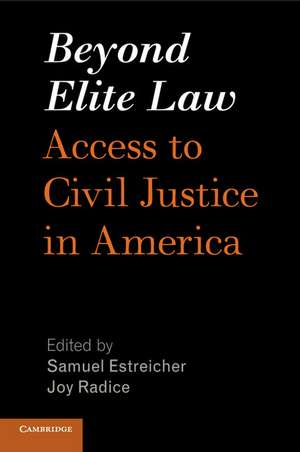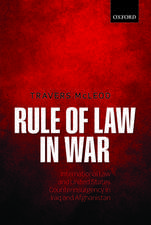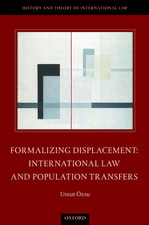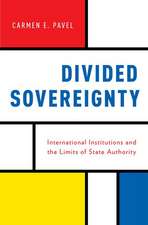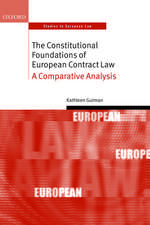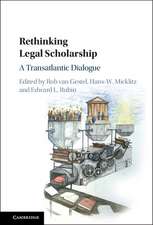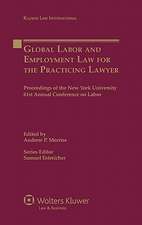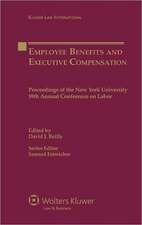Beyond Elite Law: Access to Civil Justice in America
Editat de Samuel Estreicher, Joy Radiceen Limba Engleză Paperback – 22 noi 2017
| Toate formatele și edițiile | Preț | Express |
|---|---|---|
| Paperback (1) | 392.28 lei 43-57 zile | |
| Cambridge University Press – 22 noi 2017 | 392.28 lei 43-57 zile | |
| Hardback (1) | 763.46 lei 43-57 zile | |
| Cambridge University Press – 25 apr 2016 | 763.46 lei 43-57 zile |
Preț: 392.28 lei
Nou
Puncte Express: 588
Preț estimativ în valută:
75.06€ • 78.58$ • 62.11£
75.06€ • 78.58$ • 62.11£
Carte tipărită la comandă
Livrare economică 07-21 aprilie
Preluare comenzi: 021 569.72.76
Specificații
ISBN-13: 9781107668621
ISBN-10: 110766862X
Pagini: 756
Ilustrații: 18 b/w illus. 53 tables
Dimensiuni: 154 x 230 x 40 mm
Greutate: 0.99 kg
Editura: Cambridge University Press
Colecția Cambridge University Press
Locul publicării:New York, United States
ISBN-10: 110766862X
Pagini: 756
Ilustrații: 18 b/w illus. 53 tables
Dimensiuni: 154 x 230 x 40 mm
Greutate: 0.99 kg
Editura: Cambridge University Press
Colecția Cambridge University Press
Locul publicării:New York, United States
Cuprins
Foreword; Overview; Overview; Beyond elite law: editors' introduction; Part I. Current State of Access to Legal Services by Working Americans: 1. Access to civil justice in America: what do we know?; 2. Life in the law-thick world: the legal resource landscape for ordinary Americans; 3. The need for a national civil justice survey of incidence and claiming behavior; 4. When does representation matter?; 5. Bankruptcy's false start: self-representation and the dismissal of chapter 7 cases; 6. Race and representation: racial disparities in legal representation for employment civil rights plaintiffs; 7. The unemployment action center: a student-driven response to legal need; 8. Immigrant representation: meeting an urgent need; 9. Reform at the crossroads: self-representation, civil Gideon, and community mobilizations in immigration cases; Part II. Sources of Legal Services Assistance for Working Americans: 10. The evolution of legal services in the United States: from the war on poverty to civil Gideon and beyond; 11. The effect of contingent fees and statutory fee-shifting: two models of alternative attorney-payment devices; 12. The market for recent law graduates; 13. Clinical legal education and access to justice: conflicts, interests, and evolution; 14. Loan repayment assistance as a means of promoting access to justice; 15. Federally-funded civil legal services for low-income Americans; 16. New York's lawyer referral services; 17. The growth of large law firm pro bono programs; 18. Institutionalizing pro bono; 19. Pro bono as a second career; 20. Employer-provided legal services for employment claims; 21. The Verizon pro bono program; 22. Individualized justice in class and collective actions; Part III. Fashioning a Reform Agenda: 23. Task force to expand access to civil legal services in New York; 24. New York's fifty-hour pro bono requirement for new lawyers; 25. Starting a 'low bono' law practice; 26. Toward a more effective and accessible solo and small firm practice model; 27. Facilitating homemade wills; 28. Court facilitation of self-representation; 29. Limited representation and ethical challenges; 30. Technology can solve much of America's access to justice problem, if we let it; 31. Mediation of employment disputes at the EEOC; 32. AAA consumer arbitration; 33. Saturns for rickshaws – lessons for consumer arbitration and the access to justice; 34. Employment arbitration in the securities industry; 35. FINRA arbitration and access to justice in employment disputes; 36. Arbitration as an employee-friendly forum; 37. Access to justice in employment arbitration; 38. Collaborative technology improves access to justice; 39. Union representation in employment arbitration; 40. Legal representation for New York City's Chinese immigrant workers: the role of intermediate institutions; 41. Reassessing unauthorized practice of law rules; 42. The Pyett protocol: collectively-bargained grievance-arbitration systems as a forum for individual statutory employment claims; Part IV. Creating a Culture of Service: 43. Integrating pro bono activities with the law firm's business; 44. Facilitating law firm pro bono transactional matters; 45. What bar associations do and can do to improve access to civil justice; 46. The teaching law office: service and learning in the law school years; 47. The emergency-room law school clinic; 48. CUNY Law School's community-based and community-empowering clinics; 49. A new law school in Texas to address unmet legal needs; 50. Public service residency program in lieu of the third year of law school.
Recenzii
'This book significantly advances our understanding of the failure to provide most Americans the legal services needed to vindicate important rights and provides an attractive blueprint for addressing this serious social problem.' Richard L. Revesz, Lawrence King Professor of Law and Dean Emeritus, New York University School of Law
'The authors of this volume show powerfully how access to justice is essential. Justice for only those who can afford it is neither justice for all nor justice at all.' Nathan L. Hecht, Chief Justice, Supreme Court of Texas
'This volume is a moving and remarkable tribute to the hopes for American justice, even as many chapters detail current failings. Beyond Elite Law documents when and why millions of individuals lack the resources to pursue their claims of right and their needs for representation. Yet, instead of leaving readers disheartened, the editors include a panoply of reforms, enabling debate about which routes create fair and publicly accountable responses.' Judith Resnik, Arthur Liman Professor of Law, Yale Law School
'The authors of this volume show powerfully how access to justice is essential. Justice for only those who can afford it is neither justice for all nor justice at all.' Nathan L. Hecht, Chief Justice, Supreme Court of Texas
'This volume is a moving and remarkable tribute to the hopes for American justice, even as many chapters detail current failings. Beyond Elite Law documents when and why millions of individuals lack the resources to pursue their claims of right and their needs for representation. Yet, instead of leaving readers disheartened, the editors include a panoply of reforms, enabling debate about which routes create fair and publicly accountable responses.' Judith Resnik, Arthur Liman Professor of Law, Yale Law School
Descriere
This book describes the access to justice crisis facing low- and middle-income Americans and the current reforms to address it.
